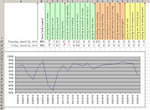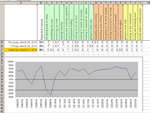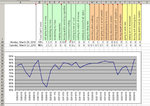more thinking about my systems' drawdown
It's only fair that just as losses were an obsession in my discretionary trading before I quit, now the systems' drawdown (which is the same as losses) are an obsession in my automated trading. And maybe that's why I failed as a discretiionary trader: because I could never see my losses as part of a natural drawdown, and instead I took them personally, each one as a personal failure.
Now it's easier to rationally accept my losses, as part of a natural drawdown. It is so, because I have the back-testing and forward-testing results, and they constantly tell me that every once in a while there will be a loss followed by more wins. The loss is followed by wins because it does not affect the system emotionally and doesn't cause it to modify the strategy. With my discretionary trading instead, losses affected me emotionally, made me upset and caused me to alter my strategy, and would therefore be followed by even bigger losses. The interesting thing is that the same happened with wins, which made me euphoric and overconfident and, because of that, altered my strategy and were followed, once again, by losses and, what's worse, losses that were out of control and blew out my account. This was the pattern:
1) loss
2) get upset, revenge trading... strategy altered (bigger leverage, more risk, less patience)
3) bigger loss ensues (because of leverage)
4) blow out account
1) win
2) get confident, euphoric... strategy altered (less patience)
3) loss ensues (see above for continuation)
With automated trading, these problems are all behind me. After each loss, the strategy stays exactly the same.
Now, back to my drawdown obsession. I tried to make things simpler and summarize them, and here's the situation.
The premise is that I want to diversify, because it's good in itself and it reduces the drawdown. Some systems are better than others, but I want to use them all. Of course, if I can only use half of them, I will use the best ones.
The general trend, is that if I trade a large number of systems, including the ones on the CL, the drawdown increases and so does the profit. But as I said, such a drawdown will increase less than if I trade more contracts on just one system, no matter how good that system is. Obviously if that system never failed, it would make sense to just trade that system and forever increase the number of contracts traded, but that's far from being the case, even for the best system.
Now, here comes yet another simplification of the drawdown situation, this time in terms of monthly gain / drawdown. This is the ultimate simplification of the drawdown tendencies of my systems (and maybe every system).
THIS IS IT
Given my preference for diversification and all other parameters being optimal, the more drawdown I accept, the more it will make each month.
Examples.
Say I trade the best combination of 20 systems, with a total of 30 contracts. I will
potentially have... say a maximum drawdown that will last a month and will cause me a potential loss of 5000 dollars, and it will happen one month per year. On the other 11 months I will make 5000 per month. This is more or less the situation.
Now, say I trade a less strict selection of systems with more contracts. I would have a drawdown of 10k, that will happen for one month, and I would make 10k every month for the rest of the year.
Now, all this would not be an issue and I would not have brought it up IF I needed more capital to trade the 10k, and couldn't trade it now. But the dilemma is: since I could start immediately trading the 10k system, which is obviously better (since it will make me 10k per month rather than 5k per month), what's really there to stop me from doing what the most convenient thing is?
The only thing stopping me is that if I incur the drawdown right after I start, I go broke (I have 14k now). If I don't and I take this gamble, then at the end of the year I will have 110k rather than just 55k.
EUREKA!
But I guess I can already see the answer to my own question (it's very useful to think out loud as i did here). The answer is that I should only start trading the 10k as soon as the 5k will bring me to a point where the 10k drawdown won't blow out my account and won't affect my ability to keep on trading. Right. Because starting off with the 5k won't keep me from moving on to the 10k as soon as I have 20k.
So that my equity curve (provided I don't encounter any drawdown) would look like this, month by month:
14k (using 5k combination of sytems/contracts)
20k
25k (I can start trading the 10k combination)
35k
45k (DRAWDOWN)
35k
By using the 10k combination right from the start I simply run the risk of blowing out my account, and gain only one month if I get lucky and the drawdown doesn't happen, since I'll make 10k in one month, rather than in 2 months (which the 5k system would require).
Is it worth it to risk blowing out my account (10% probability of it happening) just in order to anticipate retirement by one month? The last time by pushing my risk and trying to anticipate retirement, I blew out my account and postponed it by one year.
MEMO to myself:
Disable the goddamn CL_ID future until I have enough capital to
comfortably withstand its drawdown, which is about 20k.
I guess the reasoning is pretty simple here, as they point out on wikipedia on the kelly criterion entry:
http://en.wikipedia.org/wiki/Kelly_criterion
A natural assumption is that taking more risk increases the probability of both very good and very bad outcomes. One of the most important ideas in Kelly is that betting more than the Kelly amount decreases the probability of very good results, while still increasing the probability of very bad results. Since in reality we seldom know the precise probabilities and payoffs, and since overbetting is worse than underbetting, it makes sense to err on the side of caution and bet less than the Kelly amount.
If I exceed in my bet, I will risk blowing out. If I put too little, I will simply risk not maximizing my returns, but certainly I will not risk blowing out my account. As a consequence, I should try to be on the safe side. In a way, I should try to be as much on the safe side as possible, and only try to increase my equity as slowly as I'll need the money. How much money do I need right now? None, because I have a job! So why I am overbetting and hoping to get lucky? I guess it's the same restlessness and thirst for action that lead me to blowing out my account over thirty times as a discretionary trader.







